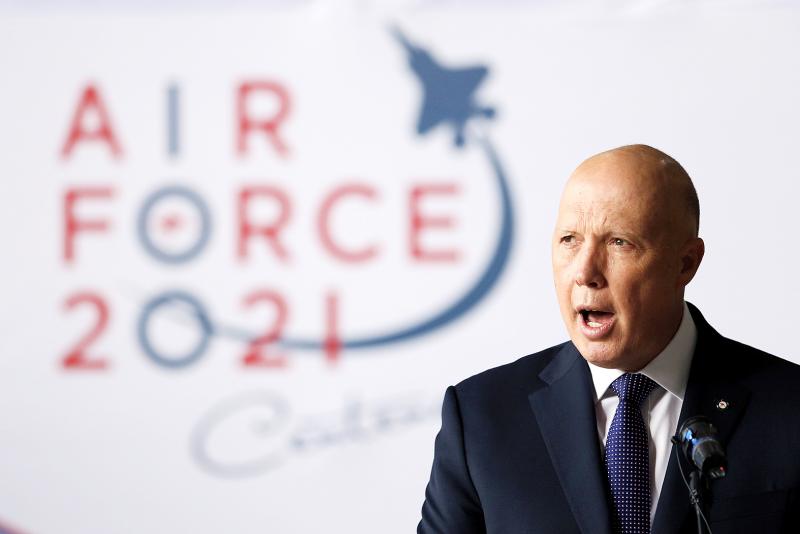Australian media yesterday cited Australian Minister for Defence Peter Dutton as saying that China would likely ramp up its pressure on Taiwan if Russia were to invade Ukraine.
A worsening of the crisis in Ukraine would likely have implications for security in the Indo-Pacific region, the Australian newspaper cited Dutton as saying.
One way that would manifest would be in China making greater encroachments on Taiwan, he said.

Photo: EPA-EFE
Dutton said an invasion of Ukraine would cause instabilities worldwide. Citing an example, he said that for a decade during the Cold War there was instability in Eastern Europe and other parts of the world had also been affected.
Dutton urged the Australian government to pay close attention to the situation in both Ukraine and in the Taiwan Strait.
Separately, the chairman of the Defence and National Security Policy Branch of the Liberal Party in New South Wales, Lincoln Parker, on Sunday said in an interview with Australia’s Sky News that a successful Russian invasion of Ukraine would “leave the door open” for a Chinese invasion of Taiwan.
“Indeed, [US] President [Joe] Biden is not committing as many troops as some would like,” he was quoted as saying.
Meanwhile, the Sydney Morning Herald yesterday published a report by US Studies Center senior fellow Bruce Wolpe, who said that if Russia invades Ukraine, China would likely seek to copy Moscow’s success.
“If Putin succeeds, and endures the sanctions and can tolerate the Ukrainian people’s uprising, and enjoys a resurgence of pride and glory across Mother Russia, [Chinese President Xi Jinping (習近平)] may want to copy that playbook for Taiwan. And sooner rather than later,” Wolpe wrote.

AGING: As of last month, people aged 65 or older accounted for 20.06 percent of the total population and the number of couples who got married fell by 18,685 from 2024 Taiwan has surpassed South Korea as the country least willing to have children, with an annual crude birthrate of 4.62 per 1,000 people, Ministry of the Interior data showed yesterday. The nation was previously ranked the second-lowest country in terms of total fertility rate, or the average number of children a woman has in her lifetime. However, South Korea’s fertility rate began to recover from 2023, with total fertility rate rising from 0.72 and estimated to reach 0.82 to 0.85 by last year, and the crude birthrate projected at 6.7 per 1,000 people. Japan’s crude birthrate was projected to fall below six,

US President Donald Trump in an interview with the New York Times published on Thursday said that “it’s up to” Chinese President Xi Jinping (習近平) what China does on Taiwan, but that he would be “very unhappy” with a change in the “status quo.” “He [Xi] considers it to be a part of China, and that’s up to him what he’s going to be doing, but I’ve expressed to him that I would be very unhappy if he did that, and I don’t think he’ll do that. I hope he doesn’t do that,” Trump said. Trump made the comments in the context

SELF-DEFENSE: Tokyo has accelerated its spending goal and its defense minister said the nation needs to discuss whether it should develop nuclear-powered submarines China is ramping up objections to what it sees as Japan’s desire to acquire nuclear weapons, despite Tokyo’s longstanding renunciation of such arms, deepening another fissure in the two neighbors’ increasingly tense ties. In what appears to be a concerted effort, China’s foreign and defense ministries issued statements on Thursday condemning alleged remilitarism efforts by Tokyo. The remarks came as two of the country’s top think tanks jointly issued a 29-page report framing actions by “right-wing forces” in Japan as posing a “serious threat” to world peace. While that report did not define “right-wing forces,” the Chinese Ministry of Foreign Affairs was

PREPAREDNESS: Given the difficulty of importing ammunition during wartime, the Ministry of National Defense said it would prioritize ‘coproduction’ partnerships A newly formed unit of the Marine Corps tasked with land-based security operations has recently replaced its aging, domestically produced rifles with more advanced, US-made M4A1 rifles, a source said yesterday. The unnamed source familiar with the matter said the First Security Battalion of the Marine Corps’ Air Defense and Base Guard Group has replaced its older T65K2 rifles, which have been in service since the late 1980s, with the newly received M4A1s. The source did not say exactly when the upgrade took place or how many M4A1s were issued to the battalion. The confirmation came after Chinese-language media reported